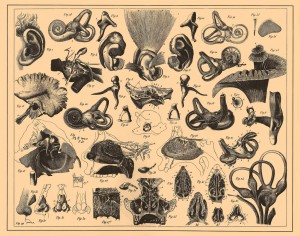Tomorrow marks the beginning of our spring events for Hearing Modernity, with a session, “Hearing through the Body”:
Mark Butler, “Cycling, Going, Grooving: On Repetition and Dynamism in Electronic Dance Music”
As always, the event starts at 4:15 pm in Holden Chapel in Harvard Yard. Precirculating papers are available here (contact us to unlock the pdf, info@hearingmodernity.org).
Although the series was organized principally at the level of individual events with pairs of speakers, some common themes emerged in the first half of the series, especially the discourse and politics of sound. Several speakers took on the question of broad narratives on/in sound–and their discontents. Our opening session with Veit Erlmann and Jonathan Sterne explicitly took up that challenge, as Erlmann reflected on Lyotard’s thinking about master narratives and Sterne examined assumptions about verisimilitude in recording and its potential for an overly facile technological determinism. Ana María Ochoa picked up similar threads in her attempt to decolonize listening and certain constellations of power and sound through a variety of sources in Colombian history, ranging from orthography manuals to European scientific expeditions to indigenous theories of bioacoustics. Charles Hirschkind’s paper on contemporary “Andalusian music” practices offered other venues for considering more contoured modes of listening and performing music.
A more overt discussion of politics came to the fore in several presenters’ work in the fall. Perhaps the most poignant focused session thus far was a two-part exchange from Suzanne Cusick and Tom Levin on the use of music as torture in the American war on terror. Cusick offered more subjective reflections on her previous research on the topic, while Levin staked out a tentative theory of musical instrumentality specific to an iPod-era that makes torture possible. Flagg Miller work on Osama bin Laden’s collection of cassette tapes is likewise bound up in the geopolitics of the very recent past, but configures that conflict within a context of an ethics of listening and the mediality of cassettes themselves–an idea that resonates with Hirschkind’s earlier work on Cairo’s soundscapes and circulations of cassette sermons.
Trevor Pinch’s presentation at our final session of the fall set the stage for our spring lineup with a number of questions at the intersection of the interface of the biological (human) and technological in his discussion of the Moog synthesizer. Sessions this spring carry this impetus forward, turning inward to reflect (more) on the many entanglements of bodies and sounding/listening. Subsequent sessions address cognition, memory and the voice, while our first session–tomorrow–opens with technologies/techniques of and for the body to facilitate listening and performance. Mara Mills will explore cochlear implants in a historical context, while Mark Butler theorizes a dynamic (and highly embodied) framework of repetition within electronic dance music.
Our sessions this spring will be as follows:
February 24 – Mara Mills and Mark Butler, “Listening through the Body”
March 11 (TUESDAY) – Aniruddh Patel and Vijay Iyer, “Sounds and the Brain”
March 31 – Wolfgang Ernst and Karin Bijsterveld, “Aural Memory”
April 14 – Brian Massumi and Steven Connor, “Reflections on the Voice”
April 21 – Jacques Attali (5 pm, Paine Hall)
All sessions begin at 4:15 in Holden Chapel *except* the concluding talk by Jacques Attali. Also, the Patel/Iyer session will be held on a Tuesday.
Finally, we warmly encourage you to check out the “Intonarumori (Noise-Makers)” tandem series at the School for the Museum of Fine Arts. Their recent guests, Ultra Red, offered a powerful reflection on the politics of sound. Check their website for more details.





Leave a Reply